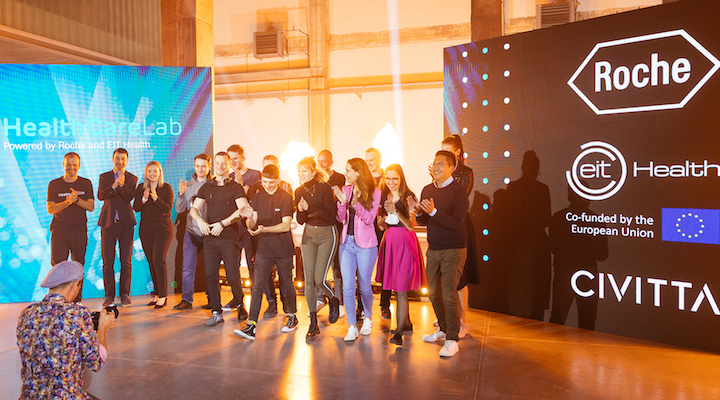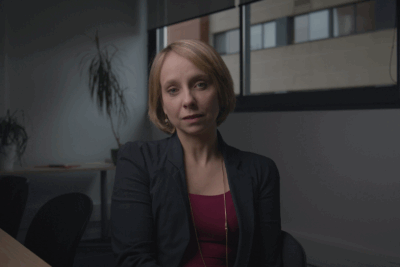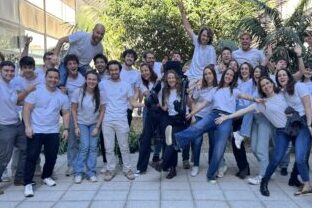19th April 2022
Data analytics and digital solutions are reshaping every aspect of life, and adapting them in medicine could help usher in a new age of personalised healthcare. Roche, one of the largest biotechnology companies in the world, teamed up with EIT Health InnoStars for the second year in a row to find promising Central, Eastern and Southern European start-ups in the fields of healthcare data management, early diagnostics and digital therapeutics to bring us closer to this new era. The Demo Day of the HealthCare Lab acceleration program offered an insight into the future of medicine.
“One of the most important trends reshaping healthcare in the 21st century is the transition from ‘one size fits all’ diagnostic tools and therapeutics to personalised healthcare. Although the term is rapidly becoming a buzzword, there are numerous promising start-up companies pushing paradigm-shifting solutions turning personalised healthcare into tangible solutions that have a measurable impact on patients’ life in Europe and beyond”, said Tamás Békási, RIS Business Creation Manager of EIT Health InnoStars, a member of the jury for HealthCare Lab.
Data is king – in healthcare, too
There are three key areas that play a crucial role in individualised healthcare. The first is data management. While Big Data and advanced analytics are used every day to create value in finance and other fields, the healthcare system often lags in capitalising on the “oil of the 21st century”.

In oncology, according to the start-up, only 3% of all data is being utilised in research & development. Although enormous amounts of information are being generated, most of it is fragmented, unstructured, some of it is paper-based, and privacy concerns also limit its potential. OncoChain, a finalist of the EIT Health InnoStars Awards 2020 from the Western Romanian city of Timișoara aims to change that. Utilising AI tools such as natural language processing (NLP), the team is developing a research platform to enable real-world data collection and analysis, which could result in new insights into oncology.
Meanwhile, a team in Kaunas, Lithuania, is seeking to utilise data during cancer treatment. BrachyDose, a finalist of the EIT Health InnoStars Awards 2019, has developed a tool that enables oncology doctors to provide more accurate treatments in high-dose brachytherapy [1] procedures for breast, cervical and prostate cancer patients. The device, according to the start-up, collects 3x more data about the radiation dose than legacy methods, directly feeding it into a treatment planning software. As a result, doctors can reduce under and overdosing, a common cause of failed cancer treatments.
Oncology is not the only area where data, or the lack thereof, is vital. Many doctors have to wait up to 30 days for imaging test results, while radiologists spend 66% of their time filling out paperwork, finds the company, Upmedic.The Warsaw-based start-up founded by practising radiologists has launched a checklist-based and voice-enabled radiological reporting system to make the lives of their colleagues easier. By using it, doctors can fill out an MRI report in 7 minutes instead of 24. The system also allows for big data analytics on radiology reports, yielding new clinical insights.
Innovative gems from Europe’s progressing regions
Recently, the three projects were selected to participate in the second batch of HealthCare Lab, an acceleration program for early-stage digital healthcare ventures in Central, Eastern and Southern Europe. HealthCare Lab is a joint initiative of EIT Health InnoStars and global pharmaceutical and biotechnology leader Roche featuring workshops, one-on-one mentoring sessions, networking and matchmaking events. It is supported by Civitta, an Estonian-based advisory firm. In 2022, more than 200 start-ups from 16 countries applied to participate in the 3-month acceleration programme, and 9 were selected in three categories. During a Demo Day in early April, a winner was picked by a jury in each of the categories, with Upmedic taking victory in the Healthcare Data Challenge category.
No personalisation without early diagnostics
Early diagnostics is another key aspect of personalised healthcare – with the latest technologies, there is no need to wait for people to get sick or only try to catch illness with large-scale “one size fits all” screening programmes.
For instance, most people have smartphones in their pockets, which could be used for diagnostic purposes – that is the idea behind Kelvin Health. The Sofia, Bulgaria-based start-up has developed a small thermal imaging camera that can be easily connected to a smartphone. By using it, everyone can make thermographic scans at home. An AI-enabled software or a remotely connected specialist can analyse the scans, looking for signs of blockages or inflammations that indicate vascular disease, breast cancer or rheumatoid arthritis. On the HealthCare Lab demo day, Kelvin Health was selected as the winner of the Screening & Early Diagnostics Challenge.
Ultrasound is another key diagnostic technology – however, as the stat-up stated, around 40% of outpatients do not follow up on discharge orders after being released from the hospital. People, especially in rural areas and low-income communities, do not have access to regular visits or medical monitoring. The founders of PONS, a pair of Turkish-German twin brothers, have found the solution in the decentralisation of diagnostics: they have developed a small, portable ultrasound device through which doctors can monitor their patients’ status remotely.
From wearable gadgets to gamified mental help
The third area where personalisation can play a major role is digital therapeutics and disease management. There are many challenges in today’s healthcare system where digitalisation can offer meaningful help to patients.
Another challenge is leg stimulation for wheelchair users. Around 1.85% of the world population use wheelchairs [2], and they must undergo regular leg stimulation to avoid muscle atrophy, stiff joints and bedsores. However, existing stimulating devices are not portable, require transfer from wheelchair to bed as well as training by professionals. Based in Iași, Romania, Synovius has developed a digital device to overcome these difficulties. Their novel device can be connected to existing mobile orthoses and turn them to smart orthoses, which can be used at home.
Mental problems also require personalised solutions, and children are not an exception under this. Calmsie, a start-up based in Lublin, Poland, aims to address this need through gaming. They have developed a gamified 4-week program where children go through a virtual space adventure to learn about their feelings while receiving therapeutic support. The solution was chosen as the winner of the Digital Therapeutics Challenge during the HealthCare Lab Demo Day.
A new edition of Healthcare Lab will be announced in Autumn 2022, stay tuned.
[1] Brachytherapy is a type of radiation therapy in which tiny capsules containing a radiation source are placed in the body near the tumour
[2] https://www.wheelchairfoundation.org/fth/analysis-of-wheelchair-need/
EIT Health and the EDIT-B consortium transform bipolar disorder diagnosis with groundbreaking blood test

Discover this life-changing project today.
Three EIT Health innovators nominated for EIT Awards

Meet our three EIT Award nominees.
Hospital Clínic study reinforces patient participation as key to digital health innovation

New work published in Journal of Medical Internet Research.